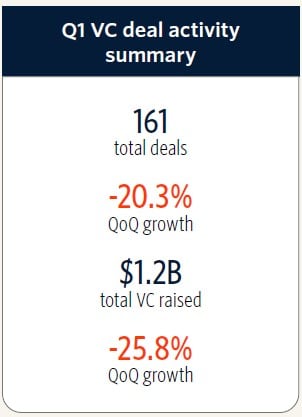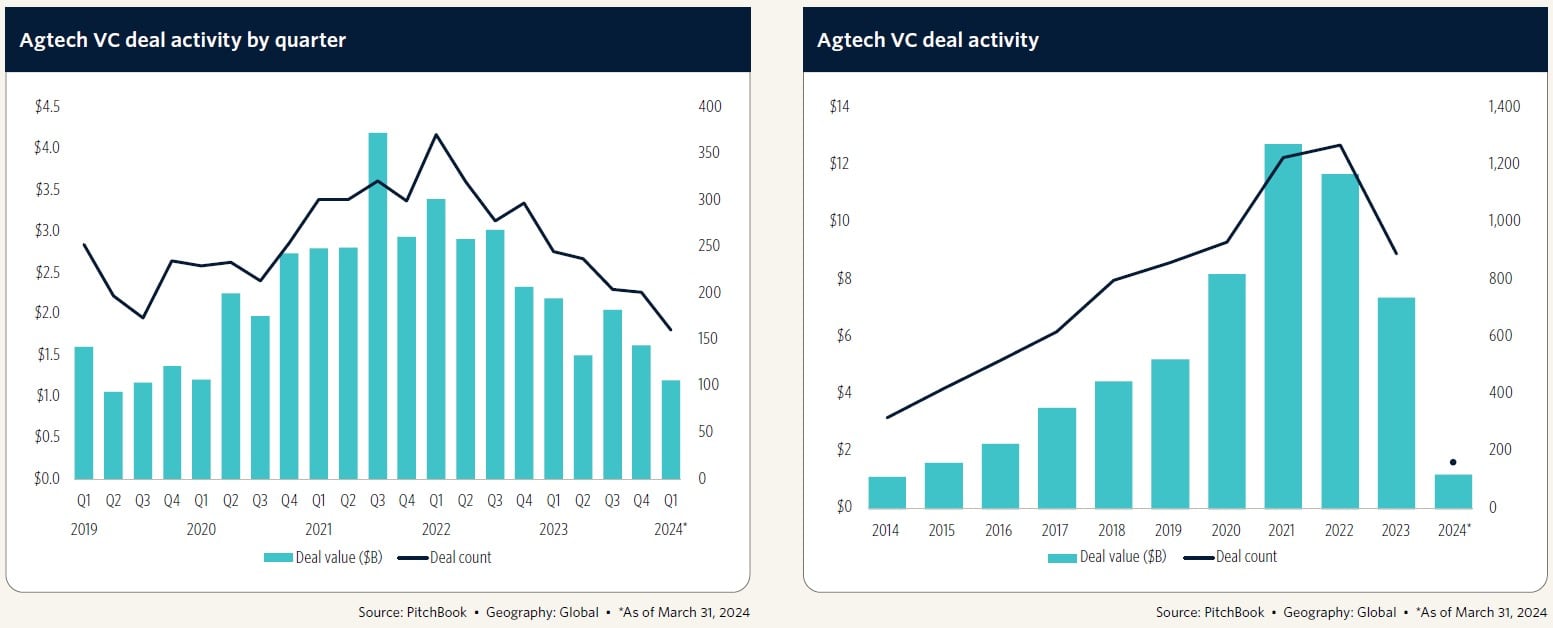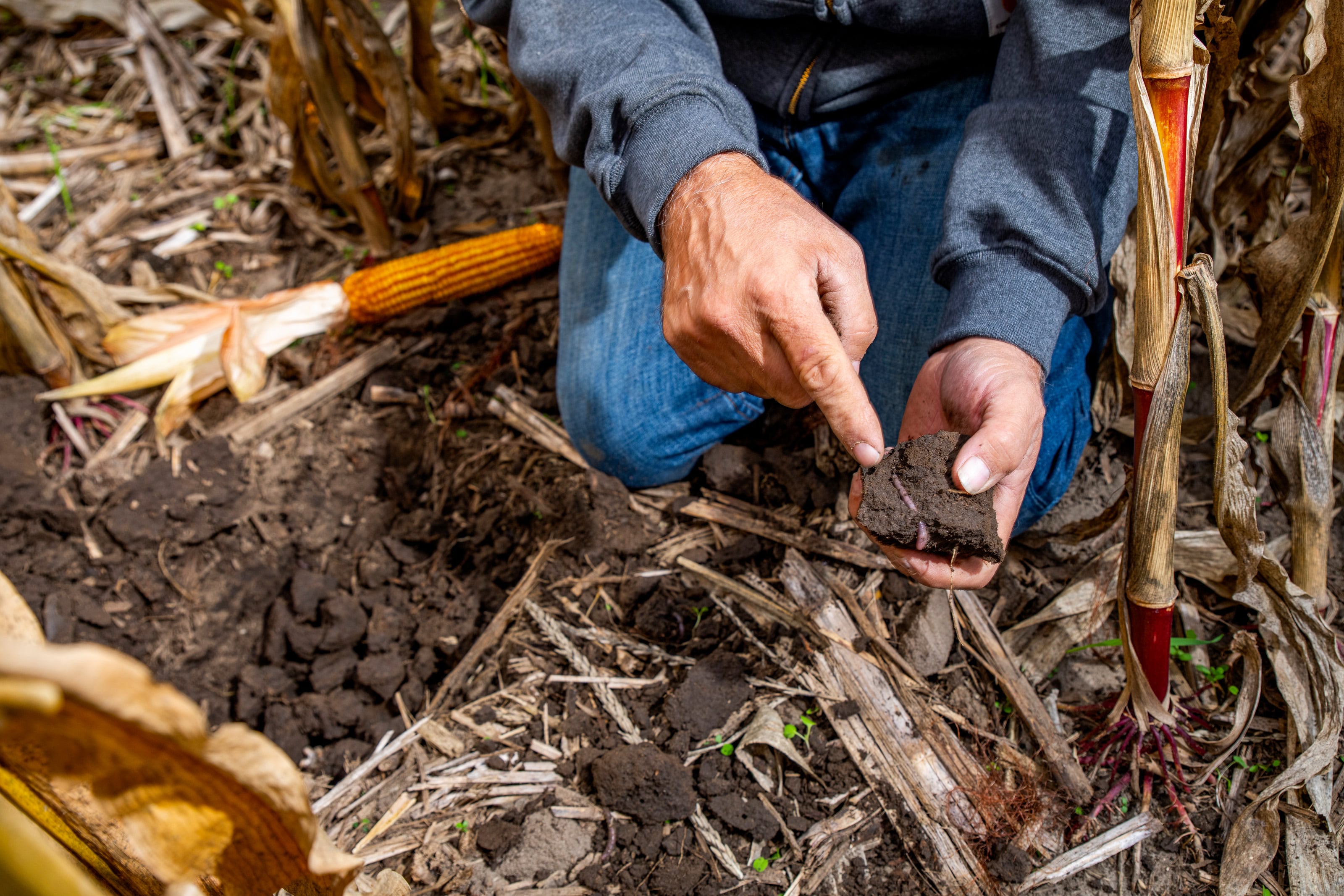Global venture capital investments in the agtech industry began 2024 with a “whimper not a bang”, according to PitchBook’s Q1 2024 Agtech Report.
Deal counts have dropped to levels not seen since before 2018, according to the investment intelligence firm’s data.

This mirrors investments in the broader VC market, which fell to a near five-year low in the first three months of 2024, according to PitchBook (with the number of estimated deals also falling to a near four-year low), as high interest rates weighed on funding for companies.
Why is agtech being dwarfed by overall VC activity?
Agtech deals have regularly made up 2.1% to 2.4% of all VC deals by count since 2018. However, their values appear to be declining faster than overall VC, according to the data. In 2022, VC investments in agtech start-ups accounted for 2.2% of total VC. This figure dropped to 1.6% in the first quarter of this year.
Overall funding in Q1 was a continuation of the downward trend of investment activity. In total, agtech start-ups raised $1.2 billion across 161 deals, down 25.8% and 20.3% respectively compared to the same data in the previous quarter.

Q1 saw its weakest quarterly VC-backed exit activity since 2019, with only six exits, down from 11 in Q4 2023. Notable exits this quarter included the acquisition of indoor mushroom farming company Smallhold by Monomyth Group and the acquisition of autonomous livestock monitoring technology provider CattleEye by GEA Group.
“A challenging fundraising environment may have eliminated much of the froth that elevated valuations to such heights over the past five years,” the report stated. Froth refers to an overheated and inflated VC market, characterised by excessive speculation, high valuations, and an abundance of capital chasing a limited number of deals.
Indeed, the median deal size was up 35% year-over-year, an indicator that more deals are concentrated in “late-stage-boon companies”. Two companies, for example, indoor strawberry grower Oishii and plant breeding platform Inari, both closed nine-figure rounds in the first of this year.
The former deal – $144.0 million Series B enjoyed by Oishii – was the largest in Q1 and stands in contrast to the indoor farming segment, which has seen funding decline by a factor of five from its peak in 2021.
The good news: aquaculture, agbusiness marketplaces and plant biotech all up
And despite declining deal counts, several categories registered an uptick in investment activity. PitchBook logged nine biomaterial deals in the quarter, up 28.6%, while plant biotech deals count totalled 28, up 21.7% quarter-on-quarter. The agribusiness marketplaces category saw 25 deals, up 8.7%, while aquaculture startups closed 11 deals, up 37.5% quarter-on-quarter.
“Agribusiness marketplaces are taking off as an innovation designed to streamline supply chains. The report “spotlights a slew of startups that are ahead of the curve,” it wrote, “from grain marketplace provider Indigo to seafood e-commerce platform Captain Fresh.”
Agribusiness marketplaces present significant opportunities for innovation and growth, noted PitchBook in the report. Blockchain technology offers “a promising solution to enhance traceability and transparency throughout the supply chain, addressing concerns related to food safety and authenticity,” it said.
Forging strategic partnerships and collaborations with government agencies, non-governmental organizations, and financial institutions can “amplify agribusiness marketplaces’ impact and address systemic challenges more effectively,” it added, to develop “comprehensive solutions to tackle issues such as infrastructure development, access to finance, and capacity building”.
Key highlights from Q1
Agtech startups raised a total of $1.2 billion across 161 deals in Q1 2024, a decline of 25.8% and 20.3% in deal counts and funding, respectively.
The largest deal in Q1 was a $144.0 million Series B investment in Oishii, a vertical farm operator specialising in premium strawberries.
Other notable deals include Inari's $103.0 million Series F, Deputy's $37.0 million late-stage VC round, and Loyal's $76.3 million Series B.
Valuations in the agtech sector underwent a correction, with the median pre-money valuation decreasing by 8.6% from 2023. However, the median deal size increased by 35.5% year-on-year to reach a record high of $4.3 million.
Q1 2024 witnessed the weakest quarterly VC-backed exit activity since 2019, with only six exits recorded.
The top venture-growth VC-backed agtech companies by total VC raised to date are:
- Indigo: Raised $1,951.6 million, with a high IPO probability of 96%.
- Farmers Business Network: Raised $1,074.2 million, with a high M&A probability of 23%.
- Plenty: Raised $941.0 million, with a high IPO probability of 69%.
- Apeel Sciences: Raised $665.0 million, with a high IPO probability of 92%.
- Ynsect: Raised $583.4 million, with a high IPO probability of 66%.
The top VC investors in agtech companies since 2023 are:
- SOSV: Completed 13 deals, with a focus on early-stage and late-stage VC investments.
- S2G Ventures: Completed 12 deals, with a focus on late-stage VC investments.
- European Innovation Council Fund: Completed 12 deals, with a focus on late-stage VC investments.
Read more: Time to just forget the glory days of 2021?
In addition, it said that “promoting and incentivising sustainable farming practices in agribusiness marketplaces not only enhances environmental stewardship but also fosters differentiation and value creation, catering to the growing consumer demand for sustainably produced foods. Through concerted efforts and innovative approaches, agribusiness marketplaces can overcome challenges and unlock their full potential as drivers of positive change in the agricultural sector”.
The report also notes excitement in the regenerative ag space. “Regenerative agriculture is gaining traction as a pathway to mitigate the environmental impact and carbon footprint of agriculture while also enhancing long-term farm health and productivity,” it said.
By way of example, Mad Capital announced a $50.0 million private credit fund to help farmers transition to regenerative practices.
HeavyFinance closed a €50.0 million fund to support agtech startups focused on decarbonization and to help farmers transition to regenerative practices.
EIT Food and a coalition of food organizations also announced the Regenerative Innovation Portfolio: €30.0 million in funding to foster agrifood value chain partnerships and scale successful regenerative initiatives.
New agtech funds also include Cibus Capital, which closed two agrifood funds: a $510.0 million middle-market PE fund and a $135.0 million VC fund; Seviora Capital, an investment manager anchored by Temasek and Norinchukin, which announced a $173.0 million agrifood tech fund targeting Asia-Pacific companies; Acre Venture Partners, which closed a $140.0 million agrifood tech fund to invest in pre-seed to Series B startups; and Hatch Blue, which closed a €75.0 million fund to invest in European aquaculture companies.
Other emerging trends and events
Another emerging trends highlighted by PitchBook is the continuing threat posed to livestock and human health by zoonotic diseases. A recent outbreak of bird flu in dairy cows has spread to at least 13 herds across six US states and has infected at least one person. This same flu has killed tens of millions of birds, including pre-emptive culling by poultry farmers. “Animal biotech and animal ag technologies will likely play an important role in addressing this and future zoonotic outbreaks,” the report declared.
It also sounded the warning that European efforts to improve farm sustainability see major pushback from farmers. The European Union has been taking steps to make farming more environmentally friendly, requiring farmers to cut the use of chemical pesticides and fertilisers, in some cases reducing subsidies if more sustainable practices are not adopted. Farmers say the measures are economically unsustainable and are demonstrating across Europe, blocking highways and city streets, crashing political events, and, in some cases, sabotaging infrastructure.
“It is unclear if the EU has a plan to address the economic challenges of transitioning farms to more sustainable practices,” said the report.




